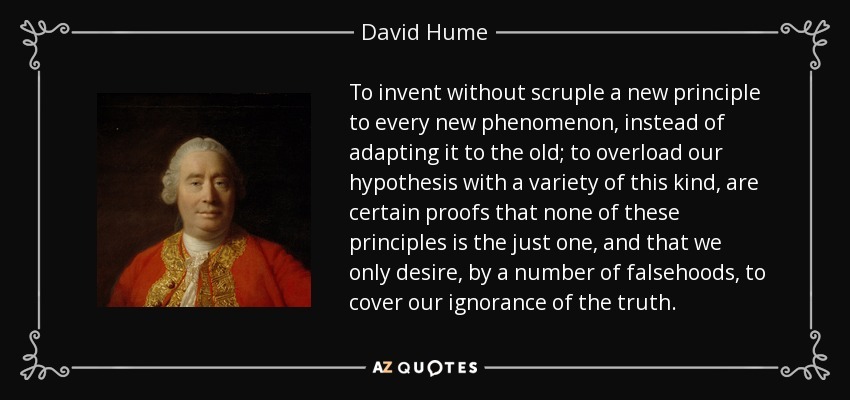Teacher’s Summary: In this essay, a student explores the ideas of David Hume on religion and morality, presenting them through a modern and personal lens. The essay highlights Hume’s skepticism towards organized religion and his belief in universal moral principles such as love and honesty. By examining real-life examples and personal experiences, the student illustrates how Hume’s philosophy can be applied to contemporary issues. This engaging analysis encourages readers to question and think critically about their own beliefs, emphasizing the importance of reason and compassion in determining moral actions. It is a compelling read that showcases the enduring relevance of Hume’s ideas.
David Hume’s Battle Against Superstition: A Teen’s Take on Religion and Morality
When my teacher first mentioned David Hume in our philosophy class, I thought, “Great, another dead guy with complicated ideas.” But as we dove into his thoughts on religion and morality, I found myself fascinated. Suddenly, all those arguments I’d heard about religion and morality started to make more sense.

Who Was David Hume Anyway?
David Hume was this Scottish philosopher from the 1700s. Think of him as the cool, skeptical uncle at family gatherings who questions everything. He had some pretty radical ideas about religion and morality for his time, and honestly, they’re still pretty mind-blowing today.
Hume’s View on Religion: It’s Complicated
Hume wasn’t a fan of organized religion, but he wasn’t exactly an atheist either. He was what they call a “rational deist.” Basically, he believed there was probably a God who created the universe, but he didn’t think this God was still involved in our day-to-day lives.
I remember thinking, “So, it’s like God set up a really complicated Rube Goldberg machine and then just left it running?” It’s a weird idea, but it kind of makes sense when you think about it.
The Problem with Religious Morality
Here’s where things get really interesting. Hume had a big problem with how religion often defines morality. He thought there were some universal moral principles that everyone should follow, like being honest, loving others, and doing your duty to your family.
But here’s the kicker: Hume noticed that religious people often ignore these basic principles in favor of following specific religious rules. It’s like if I ignored my homework to pray for good grades instead. Hume would probably say, “Kid, just do your homework!”
Real-Life Examples: When Religion Goes Wrong
Hume’s ideas really hit home for me when I thought about some recent events. Take the 9/11 attacks, for example. The terrorists claimed they were acting in the name of their religion, but they completely ignored the basic moral principle of not harming innocent people.
Or think about the Crusades we learned about in history class. Christians killing Muslims in the name of God? That’s exactly the kind of thing Hume was worried about.
It made me realize that sometimes people do terrible things because they’re so focused on following their religion that they forget about basic human decency.
Finding the Balance: My Personal Struggle
All this got me thinking about my own beliefs. I come from a religious family, and I’ve always tried to follow the rules of my faith. But sometimes, those rules seemed to conflict with what I felt was right.
For example, there was this time when my friend came out as gay. My religious community wasn’t very accepting, but I knew in my heart that rejecting my friend wasn’t the right thing to do. Hume’s ideas helped me understand that being a good friend (following the principle of love) was more important than following a specific religious rule.
The Big Question: Where Does Morality Come From?
Hume’s ideas led me to a huge question: If morality doesn’t come from religion, where does it come from? Hume thought that there were some universal principles, like love and honesty, that were just inherently good.
This blew my mind. It meant that even God follows these principles because they’re good, not that they’re good because God follows them. It’s like saying, “Treat others with kindness” is a good rule not because God said so, but because it’s just fundamentally the right thing to do.
So, What’s the Point of Religion Then?
After all this, I found myself wondering if Hume thought religion had any value at all. From what I understand, he didn’t think religion was all bad. He just thought it was dangerous when people used it as an excuse to ignore basic moral principles.
This made me think about my own religious practices. I realized that the parts of my religion that encourage me to be kind, honest, and helpful to others are probably in line with what Hume would consider good morality. But any parts that might lead me to judge or harm others? Those are the bits I need to be careful about.
Conclusion: Thinking for Myself
Studying Hume’s ideas has been a real eye-opener for me. It’s taught me that it’s okay to question things, even when it comes to religion and morality. I’ve learned that being a good person isn’t about blindly following rules, but about using reason and compassion to figure out the right thing to do.
I’m still figuring out what I believe, but thanks to Hume, I know that whatever path I choose, it should be one that aligns with universal principles of love, honesty, and kindness. And most importantly, I’ve learned that it’s okay to think for myself and question things. After all, that’s what philosophy is all about!
References:
- Hume, D. (1779). Dialogues Concerning Natural Religion. London: W. Strahan.
- Hume, D. (1751). An Enquiry Concerning the Principles of Morals. London: A. Millar.
- Ayer, A. J. (1980). Hume: A Very Short Introduction. Oxford University Press.
- Baier, A. (1991). A Progress of Sentiments: Reflections on Hume’s Treatise. Harvard University Press.
- Cambridge University Press. (2008). The Cambridge Companion to Hume.